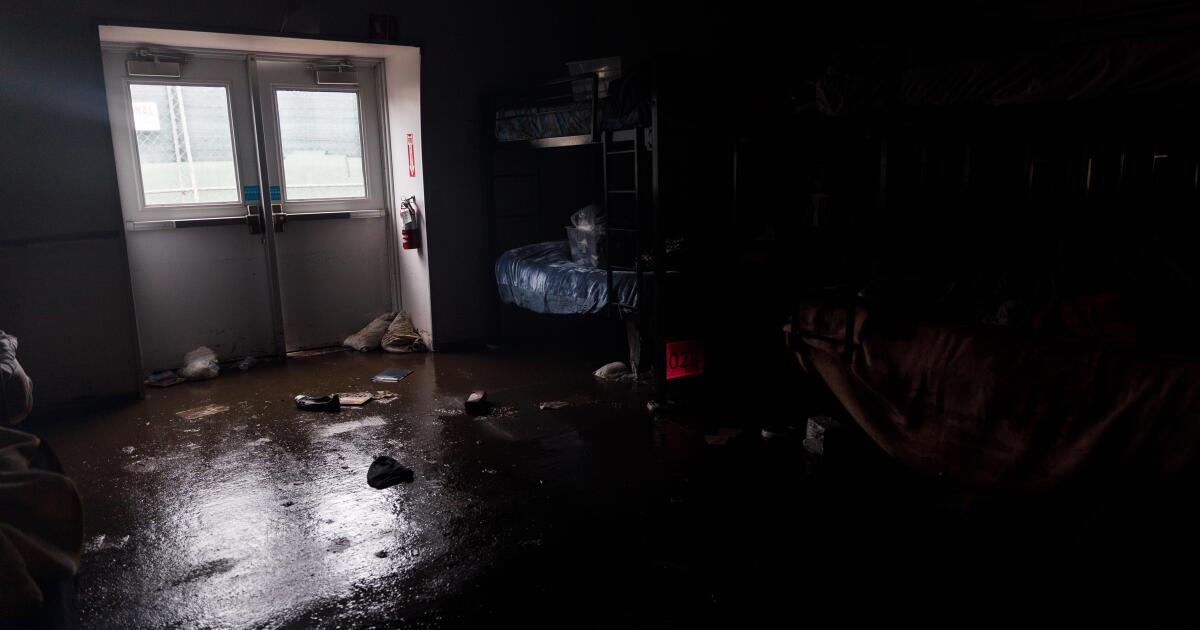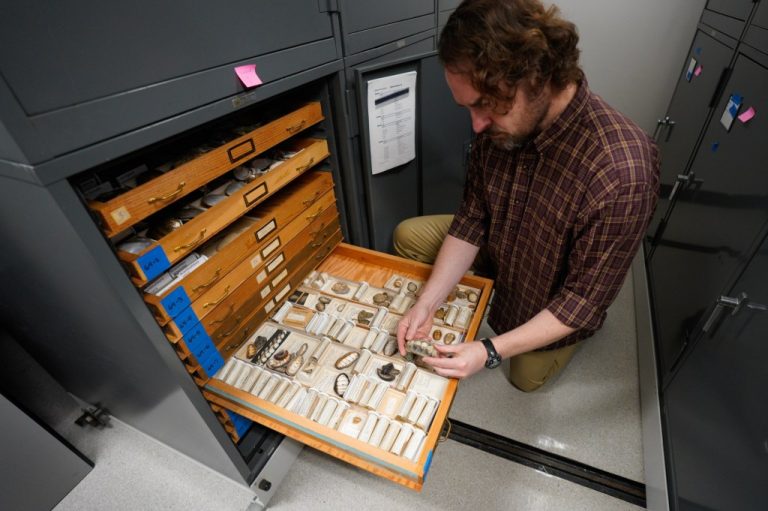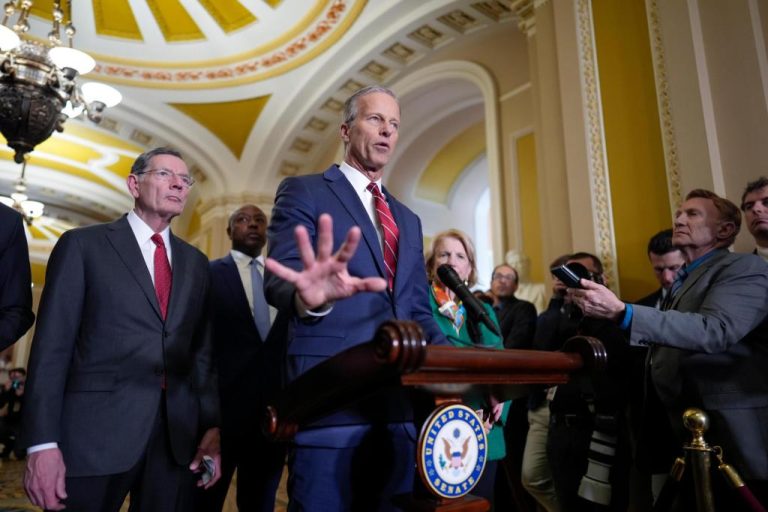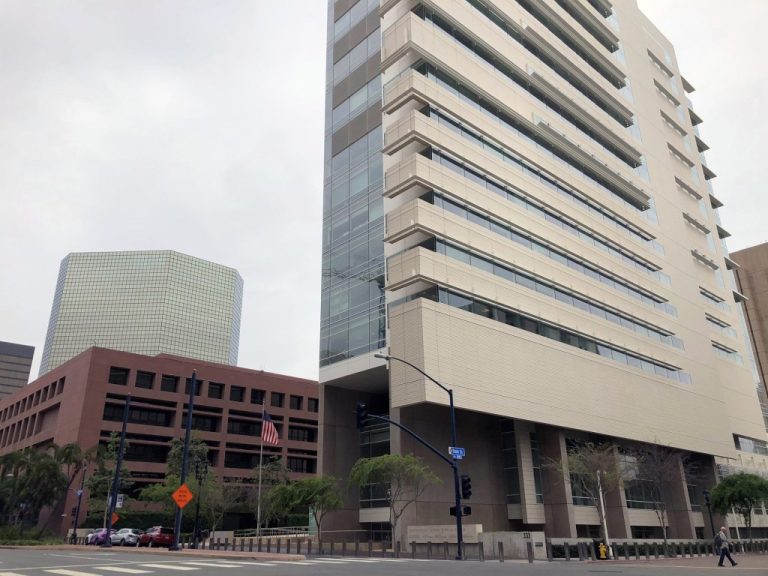
Elizabeth Kenoyer stood Monday afternoon on a downtown intersection in the gathering mist.
Gray hair was matted against her forehead. A pink hoodie sagged with rainwater.
She stared through a chain link fence at a large white tent. Somewhere inside was her heart medication. Kenoyer just had to get past an upturned dumpster, two overturned refrigerators, 10 fallen Porta Potties and who knew how much water.
“It’s life or death for me,” she said.

Mud and debris are scattered at the Alpha Project tent shelter by 16th Street and Newton Avenue after flooding in San Diego on Monday.
(Kristian Carreon/For The San Diego Union-Tribune)
Kenoyer was one of hundreds of people displaced Monday from two homeless shelters amid flooding caused by unexpectedly heavy rains, but the damage was especially pronounced at Alpha Project’s Bridge Shelter by 16th Street and Newton Avenue, where several residents said they’d had to flee out the back through waste-deep water.
“The inside is completely destroyed,” Bob McElroy, Alpha Project’s president and CEO, said in a phone interview.
Cleaning could take months if the tent was even salvageable, he said. The nonprofit also lost two vans.
While the same shelter previously flooded in 2018, McElroy said this round was worse.
Paul Black, 60, was inside Monday morning, watching the local Fox News, when he spotted water streaming through the front door, he recalled.
Then the lights cut out. Black thought: This does not seem like a good situation.
A staffer, Kiara Johnson, had only recently started a shift as a security monitor and she hustled outside to move her Mercedes — only to find that the current had already carried her car across the street and wedged it between a pole and a fence.
She tried to walk over but the water was at her chest, she said later. Johnson climbed on top of a Toyota Corolla until firefighters helped her down.
When she finally got to the Mercedes, its electrical system had shorted out, rendering her key fob useless. There was no way to unlock the door. Hours later, you could still look through the driver’s side window and see Johnson’s purse floating above the gas pedal.
By late afternoon, several city trucks were stopped by the entrance of the tent. A few people stood on a sidewalk, waiting for rides from an Alpha Project van, and officials said more than 180 had already been taken to a building in Balboa Park.
Two staffers by the fence warned away passerbys. A few shelter residents lingered in the area, hoping they’d eventually be allowed to enter.
Patricia Haggard, 58, sat idling in a pickup. Her socks were still wet from the evacuation and she was nervous about what was inside — Haggard said she’d seen sparks shoot out of a submerged heater — but she hadn’t been able to grab her wedding ring.
Another woman pulled up alongside in a Blue Kia.
“There’s still water in there,” Haggard told her. “They’re not letting anybody in for five days.”
“What,” the woman exclaimed from the driver’s seat. “My driver’s license is in there.”
A few minutes later, the decision changed: Residents could go to their beds and salvage what they could. Quickly. Several people strode past the fence and through the front door.

Some people were allowed back inside the Alpha Project tent shelter downtown to search for important belongings after flooding in San Diego on Monday.
(Kristian Carreon/For The San Diego Union-Tribune)
Inside was almost total blackness. At first, the only sound was an electronic beeping, caused by some hidden machine. Then English and Spanish began to echo throughout.
“Help me please, I can’t see.”
Beep.
“Somebody stole my ear pods.”
Beep.
“My kid’s pictures!”
Wet shoes squeaked on the asphalt floor. Those who hadn’t lost their phones turned on lights, and the beams flickered through bed frames, casting shadows on the cavernous ceiling.
It looked like most people had stacked belongings on their bunks. One mattress held two prescription bottles for medication that can be used to treat thyroid cancer. A few beds away, Haggard opened a pair of plastic bins. She surveyed their contents and mumbled, “I don’t want to leave my clothes either.”

Patricia Haggard, who’s been living at the Alpha Project tent shelter downtown for about four months, searches through her belongings after flooding in San Diego on Monday.
(Kristian Carreon/For The San Diego Union-Tribune)
An overturned walker sat in one corner by an oxygen tank. Nearby were two traditional wheelchairs and three electric ones, the black metal stained with mud. A man gestured toward one of the empty seats and said, “We carried him away.”
A voice called out from the front. “Whoever’s going back to the new site, we gotta go.”
Beep.
Outside, Kenoyer, the woman missing her medication, had opted to call 911.
She felt bad about bothering paramedics, but Kenoyer had heard that pharmacies were closed and she didn’t know where else to turn.
A little after 4 p.m., an ambulance pulled up. Kenoyer walked their way, hoping they could help.

Elizabeth Kenoyer speaks to first responders outside the Alpha Project tent shelter in downtown San Diego Monday.
(Kristian Carreon/For The San Diego Union-Tribune)






